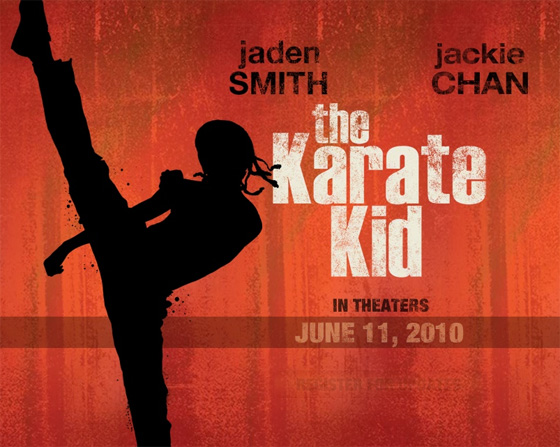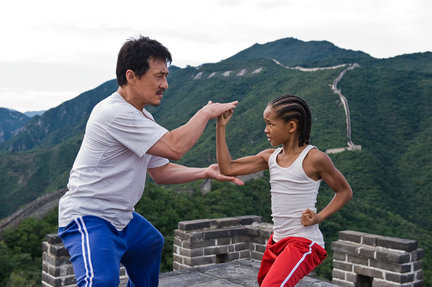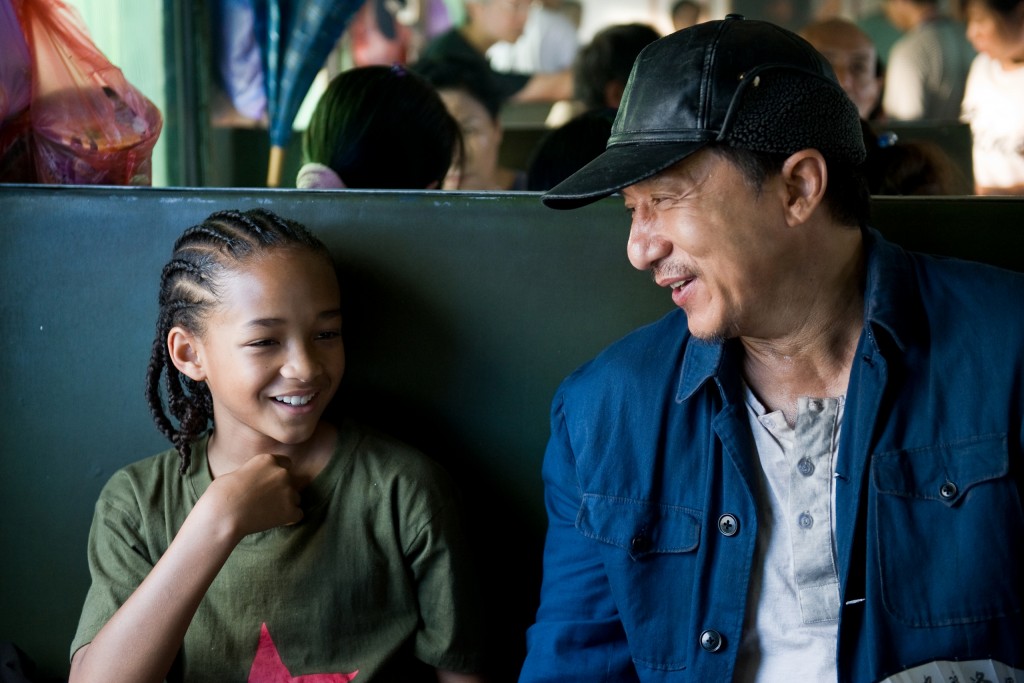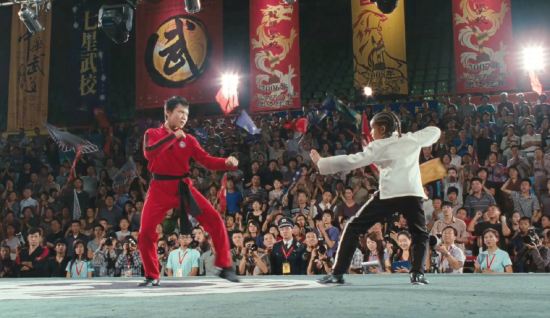Fri 11 Jun 2010
Wax On, Wax Off
Posted by Ethan under Film Review, NYC Film Critic
[6] Comments
The Karate Kid
Directed by Harold Zwart
Screenplay by Christopher Murphey
Starring Jaden Smith, Jackie Chan and Taraji P. Henson
**
Released in the summer of 1984, The Karate Kid remains a convincing and well-crafted coming-of-age story, a genre that’s often runs the risk of succumbing to contrivance and corn.
The key to the film’s success is its low-key attitude; there are relatively few histrionic outbursts of teen angst–best typified by one of those “parents just don’t understand!” tirades–or pop-song fueled montages of the central character falling in love and/or moping about breaking up. It’s also worth noting that, for a movie called The Karate Kid, there’s not a lot of karate in it, at least in terms of mano-a-mano combat. And the bouts that do occur, particularly in the climactic scenes at the karate tournament, are far from the body-slamming brawls that define most martial-arts themed action movies. The film really does believe the central lesson its wizened sensei, Mr. Miyagi (the wonderful Pat Morita) tries to pass on to his student Daniel (the endearingly awkward Ralph Macchio): karate isn’t a weapon, it’s a discipline that helps instruct you on how to live your life. Daniel’s true coming-of-age moment doesn’t occur in the championship match when he uses that awesome crane move to defeat his nemesis Johnny Lawrence. It happens when he realizes that Miyagi’s lessons aren’t simply designed to make him a stronger fighter–they’re meant to make him a stronger individual.
The new Karate Kid attempts to walk the walk and talk the talk of its predecessor, but there’s a hollowness to this remake where its heart should be. A big part of the problem is that the new version builds to a finale that celebrates violence in a way that the original didn’t (and its sequels unfortunately did). The tournament battles in the ’84 Kid were closer to sparring sessions–here they unfold as full-on gladiatorial combat, with the contestants hammering away at each other with a fury and power straight out of a Rocky sequel. It would be one thing if the fighters were in their late teens or twenties, but these kids are all 12 and under and the sight of them kicking the crap out of each other in front of a roomful of cheering adults (including their parents!) left a bad taste in my mouth in much the same way that Hit Girl’s antics in Kick-Ass did. But at least Kick-Ass seemed to realize that its pint-sized warrior’s antics were over-the-top. The Karate Kid thinks it’s a mark of honor for a 12-year-old to deliver rib-cracking blows to his opponent. In fairness, I should point out that the young audience I saw the movie cheered throughout the tournament probably in much the same way that I rooted for Daniel to kick some Cobra Kai butt when I first saw the original Karate Kid at age 7. For me though, the overall tone of the sequence significantly altered the message of the original film as well as the dynamic between the teacher and student, portrayed here by Dre (Jaden Smith) and Mr. Han (Jackie Chan). Where Miyagi taught Daniel karate as a way to bring balance to his life, Han’s ultimate lesson to Dre boils down to “When the world knocks you down, get back up and punch it in the face.”
The last sequence is my least favorite thing about the movie, but there are a number of other problems besides, starting with its 11-year-old leading man. I don’t want to spend too much time picking on the young Mr. Smith (the son of Hollywood power couple Will Smith and Jada Pinkett Smith) who seems like a nice kid trying his best to live up to his very famous parents. Unfortunately, he’s just not a particularly compelling screen presence; his performance is noticeably stiff and mannered, as if he’s consulting with an acting coach in between takes. He also fails to generate much chemistry with his more experienced co-star. For his part, Chan demonstrates a solid grasp on his character but can’t improve on the screenplay’s limitations in the same way Morita did. Like Miyagi, Han inevitably turns out to be nursing some private pain, but his big breakdown lacks the necessary emotional intensity. The filmmakers have also unwisely carried over the love story from the original movie, matching Dre up with aspiring violinist Meiying (Wenwen Han) torn between her feelings for the new kid in school and her parents’ expectations. Again, the kids’ ages works against the movie here; while the script attempts to play their romance as chastely as possible, there’s still something creepy about rooting for two 12-year-olds to hook up.
The biggest (and really only) narrative point of departure between the two Karate Kids is the setting. The original, of course, sent Daniel from the wilds of New Jersey to the beaches of California. The remake dispatches Dre and his mother (an underused Taraji P. Henson) from Detroit to Beijing. It’s worth noting that this Karate Kid was co-produced by the state-run China Film Group Corporation, which granted the filmmakers access to such famous sights as the Forbidden City and the Great Wall as well as the ability to shoot extensively in and around the capital city. Of course, the company also had control over how China was depicted onscreen, which explains why the version of the country seen here bears only a passing resemblance to the real place. It’s interesting that many of the same critics that ripped Sex and the City 2 to shreds for its admittedly cartoonish representation of Abu Dhabi aren’t calling The Karate Kid on its various inaccuracies, among them the notion that Dre would be able to attend what appears to be a Chinese public school despite not speaking a word of Mandarin as well as the existence of mountaintop temples populated entirely by people practicing their kung-fu techniques. (As pointed out elsewhere, the film’s title doesn’t make a lot of sense considering that Mr. Han specifically instructs Dre in the ways of kung-fu and not karate, which is a Japanese discipline.) This speaks to the overarching difference between the original and the remake: the 1984 Karate Kid has an understated realism that makes a familiar story seem fresh, while the 2010 Karate Kid is a glossy, embellished star vehicle that offers little we haven’t seen before.
The Karate Kid opens in theaters nationwide today.





Enjoyed reading this review, thank you very much for it and for intelligently point out the flaws. I do not understand why this film is getting so many good reviews with these blatant flaws and I am not just saying that because I am a big fan of the original but as if the video game fighting tournament and the love story angle by pre-buscent kids isn’t awkward enough, how does a kid who cannot speak a word of Chinese attend the school that predominantly speaks that language? Just…okay. I’ll keep my original thank you very much.
I found it very distracting that some of the same line were used in this verson. I found myself comparing the two movies. I also thought the use subtitles hurt this movie especially when used by the bad kung-fu instructor. In the 84 verson when John Kreese barked his orders at the Cobra Kai’s students you knew there was hell to pay. I when into this movie with an open mind and wanted love this new film, but the acting was to forced. I actually found myself rooting for the movies bullies.
A very interesting review – if not completely different from my own perspectives. A couple things:
1. As a Chinese, I actually found this film to be refreshingly accurate in its portrayal of China. If you walk the streets of Beijing today, the scenes shown are exactly what you would see. In addition, the school is simply explained in the fact that the teachers all spoke English…e.g., it was an international school. Most foreign students attend international schools and given the language of instruction is English that is not an issue (native Chinese students also attend these schools but must have a certain level of English proficiency).
2. My other main disagreement, partially recognized by the reviewer himself is the fight-scenes. I understand as adults, we often disapprove of teen violence or romance. However, the violence is I think a much closer to reality and is refreshingly honest in what it would actually mean to compete in a kung-fu tournament I will admit the fight scenes at times made me cringe and it was somewhat unrealistic they would not have rules against kicks to the head / ribs were not actually broken.
3. Finally, I think the biggest issue with this review is it’s nostalgia for the original movie. While the original is admittedly great, I felt this movie delivered such as well.
I don’t really know who would want to review things for a living… I wouldn’t.
“The Kung Fu Kid” does not sound as good as “The Karate Kid” but other than the title, I think this was a solid remake. I cheered with the rest of the audience at Dre’s final Kung Fu move and was moved to tears when Mr. Han broke down and cried. It was a nice touch to have all the former “baddie” students bow down to Mr. Han. The acting was just right (targeted for kids AND adults). Best summer movie so far. Don’t know which movie you saw.
Sara, go see the movie. It is much better than the reviewer implies. The “flaws” pointed out were points that I feel were completely mis-interpreted by the reviewer, which makes me wonder if this guy was a bully when he was younger. He did not “get” this movie at all, perhaps due his nostalgia for the original. Whatever the reason, the reviewer doesn’t know “heart” when he sees it, as this movie oozed it in almost every scene. Even the fight scenes…if you watched the eyes of those kids, they were torn between complying with their coach to win at all costs, and their inner selves. Mr. Reviewer, please watch the movie again with your prejudice set aside. You missed a whole lot.